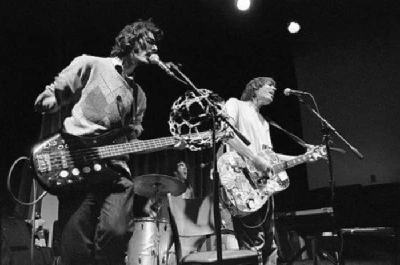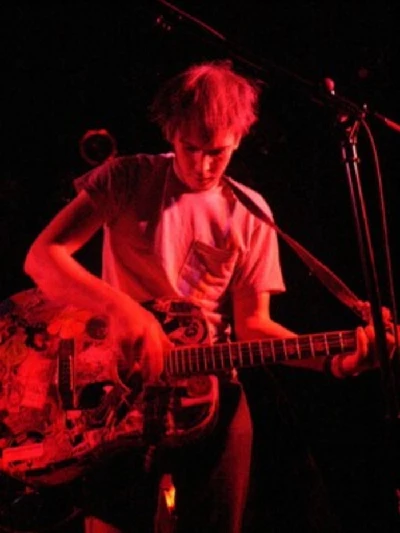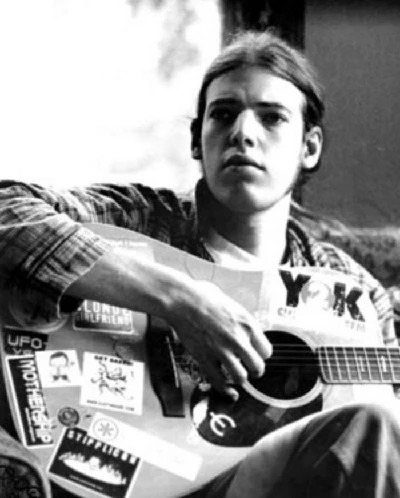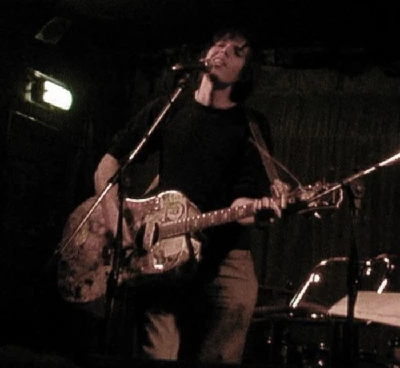published: 11 /
1 /
2008
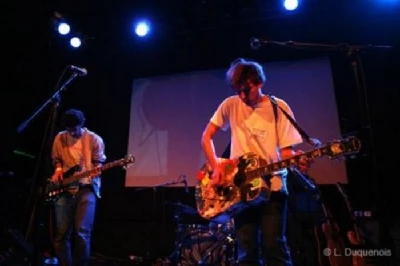
Mark Rowland talks to New York-based musician and comic book artist Jeffrey Lewis about his new covers album, '12 Crass Songs', which re-invents the anti-authoritarian rants of 70's anarchists Crass as a collection of indie-folk songs
Article
The idea that Crass songs could sound sweet was a foreign concept until last year. Before then, they were mainly associated with shouting and anarchy. It would take a person of some vision to re-invent their anti-authoritarian rants as sweeping indie-folk. Luckily for all of us, Jeffrey Lewis had that vision.
His ’12 Crass Songs’ album managed to completely reinvent the sound of the anarcho-pacifists, bringing out the humour and melody of the songs without distorting their original sentiment. It was praised in end of year lists in several blogs and magazines and praised by critics on both sides of the Atlantic.
Speaking to us from his home in New York City, Lewis explained that he took on the project to bring Crass songs to a wider audience.
“I had the idea originally a couple of years ago, because I found that there was a gap between how great I thought Crass songs were and how many people didn't seem to get how great they were,” he says. “It seemed quite a good idea to get a new angle on them so that more people could get something from those songs. I thought that Crass' songs were so good that they would be fairly easy to reinterpret and I had a bit of free time between projects, so decided to put it together.”
This was Lewis’ first album of covers. His previous three, ‘The Last Time I did Acid I Went Insane and Other Favourites’, ‘It’s the Ones Who’ve Cracked That the Light Shines Through’ and ‘City and Eastern Songs’, are all his own material, with help from his brother Jack; lo-fi folk punk with cleverly humourous lyrics. His music has been labeled anti-folk, a tag that is often used to describe bands and performers producing music that marries folk’s stripped-down song writing with punk’s energy.
Perhaps it is punk and folk’s seemingly natural affinity for each other that allows Crass songs to work acoustically. Although the songs are far removed from the original Crass sound, Lewis says that most of the songs were pretty straightforward to re-arrange:
“You can't really go wrong with songs that are that great, I had several different ideas on how to approach each of the songs. If I'm honest I could've easily done another twelve or thirteen songs, easily. I started work on a lot of songs and ended up with the final twelve because they were the ones that I felt were complete. I had a whole bunch more that I was working on and they didn't make it on the album because they never really got finished. The album was basically made up of arrangements that I was completely happy with rather than the definitive list of Crass songs. That said, some of my all time favourite Crass songs did make it on there.”
According to Lewis, the lyrics rather than the music took time to re-arrange.
“A lot of the songs in their original form are basically free-form rants,” he says. “I had to edit them a bit, take some stuff out and break them up a bit, like make this bit a chorus, that bit a verse, that bit a bridge, stuff like that.
“I didn't really need to change the references that much; I changed a couple, but it didn't need much. Crass weren't really writing topical songs about the headlines of the time. They were writing about a system that was in place then and still is now, and the way that system operates. It doesn't matter if you make reference to Ireland or the Falklands or Iraq, it's still the same message, it's still a bullying strong country putting pressure on a weaker country because it has something that the stronger country wants. These are issues that are still around today, so Crass' message is still relevant. In fact I think their songs are even more relevant today than they were then, because there isn't a band like Crass around to tell people what's going on.”
The album’s tracks vary from the pastoral folk of ‘End Result’ to the slow-burning indie rock of ‘Big A little A’, to the vaguely funk punk ‘Walls’. Lewis says that making the album allowed him to concentrate on arrangements and production more than any of his previous albums.
“I think I allowed a good mix from the number of options for each song that I had picked out in my head,” he says. “I tried to produce each song in a different direction, so there was a lot of variation on the album. The project allowed me to work in a way that I might have resisted with my own material. I think it was because my creative influence on the songs was primarily in the production of each song, so it allowed me to really work on that side of things in a way I hadn't really done before. The only song that posed any difficulties I think was 'Punk is Dead', which is the really stripped down song on the record. Originally it was going to be more produced, with more instruments arranged around it, but I decided I'd rather keep it stripped down and simple. I wanted at least one of the songs on the album to be really basic.”
Considering how successful the finished album has been and the amount of enjoyment he has got from the project, would Lewis consider doing any more cover albums ?
“I've got no plans or anything, but I'm not adverse to the idea. Throughout my career I've done a lot of cover songs and I've come to do a lot of unexpected covers or songs that seem impossible. For example, we've covered the Last Poets before and we've also done 'The Murder Mystery' by the Velvet Underground, which I don't think even they attempted live. Part of the joy of being a music lover is that you can play stuff to people that they might not have heard, but you know they'll get some enjoyment out of and playing cover songs is a great way to do that.”
He thinks for a moment: “I've been thinking about one project for some time. My uncle is a rapper in New York. He goes by the stage name of Professor Louie. He was kind of a hero of mine growing up. I'd like to do an album of his songs, from across his albums. That would be sort of a challenge, but it would be a good fit as well - his stuff's not far removed from the Last Poets. It would be good to work with him on the project, or any project, really.”
In many articles written about Lewis in the past, writers have talked of how he emerged on New York’s anti-folk scene with a fully-formed sound, playing open mike nights around the city. Lewis disagrees, seeming slightly incensed by the suggestion.
“It may seem like I had a fully formed sound to my music, but that's because ten years later it's still doesn't sound fully formed,” he says. “I mean, I can't really sing and I think that my sound and performances have a scrappy quality to them. That scrappy element hasn't really gone away.”
Lewis started playing music in 1998, but had been making comics for some years since then. At the time, Lewis saw it mainly as a hobby, plus a way to sell his comics.
“Every week I'd write a bunch of songs and play at an open mike night. It was really great. There were a lot of good people performing there,” he says. “It was a really good place to meet people, plus it was great for me to practice my drawing. You had this change over of performers so you had something good to draw. After a while, my comic books started selling and I started making tapes of my songs, which I sold as well. I was out of school at that point so I had a lot of free time to fill.”
He was also looking at a career in education at the time, working as an assistant teacher at a New York school.
“I was helping teenagers prepare for their SAT exams, which are American standard tests. I was mostly teaching English and vocabulary and a certain amount of math, which I was always pretty bad at.”
Although his comics and music seem to have taken priority of late, Lewis still has an interest in education and believes that his performances and comics have a certain amount of teaching in them, though it is difficult to see the educational benefit of songs like ‘Chelsea Hotel Oral Sex Song’.
“I’m doing a comic at the moment about the history of Woody Guthrie and another about the Guggenheim museum. In both the comic books and the music I make sure that an element of teaching is a part of it. I think there are similarities between performing and teaching. In both fields, you have to keep the kids focused and you want them to come feeling engaged and excited about what they’ve heard.”
It has been reported that Lewis’ is working on a book about the history of communism. Is this true and if is, how close is he to finishing it?
“I think that’s more of a rumour based on the performances I’ve been doing, a sort of spoken word performance, like an illustrated running history of communism,” he explains. “As part of the performance I show the drawings while singing the songs. There’s a lot of You Tube footage of all that stuff.”
Lewis admits that the idea of communism fascinates him. He is clearly a liberal minded man and believes that the concept is worth seriously looking at as a governing system despite its flaws when put into practice.
“Now that we’re in the 21st century it’s a perfect opportunity to think about how the planet can go forward,” he says. “I think it’s worth us thinking about how to manage the concept, so that we can use it to make a better world.”
Lewis believes that communism has wrongly been ruled out as an ideal for western civilization and that it comes down to the second world war and the commencement of the cold war.
“At the beginning of the last century, there were all these different ideas about how we should govern,” he explains. “For some it was Fascism and for others it was free-for-all capitalism. Let only the strongest survive ! Then there was this other concept of having a communal system, where even if someone’s production power is not as strong, they can still survive; they still get a share. There was this battle of how we can make use of all these things and the idea of free market capitalism has ended up on top. But it doesn’t mean that it is the one that allows humans to move forward. Communism as a concept and its problems and benefits are just fascinating. I think we should look at it again properly so that we can learn from its mistakes and go forward taking some of that with us.”
Considering Lewis’ socialist views, it would be interesting to know what he thinks of the impending elections in the US, especially considering the money driven nature of American politics. How does he feel about the fact that the system in place in the US is controlled by those who can afford to fund election campaigns ?
“I think this has been the case in this country over the past 50 years, since the advent of TV and the fact that you need a lot of money to access that medium,” he says. “That’s why it’s important for artists to investigate and educate people about all their options.
“Artists are free to reach a lot of people without being influenced by money, it’s about the quality of the art. A politician needs a lot of money to get their opinions out there and be heard by people. Artists don’t need millions. They just need to be interesting to be heard. It’s a leveling of the playing field. It’s a source of hope for millions and millions of people who are not in control of who runs the country and what gets decided. If something grabs people’s attention because it’s cool art, we have the ears and eyes of a lot of people listening to what you have to say.”
Lewis might not totally agree with the system that the US operates under, but neither is he rash or ill informed when it comes to politics. He is certainly not anti-voting:
“I always think it’s better to at least vote for somebody who you feel will bring a change of pace, even if that candidate is Republican,” he says. “If people don’t vote, it’s essentially a vote for things to stay the same. This current regime has been damaging to the American economy. We’re paying for the choices that have been made over the past few years. It is still too early to say how the next elections will go. It’s so far away it’s difficult to judge. It is still somewhat in flux so it gets more heated.”
Lewis can still look on the bright side, however:
“Currently it is great that the American economy has got screwed up. Because when I play Europe, I get paid in pounds or euros and it turns into a lot more dollars when I get home. It must be bad for bands touring over here from Europe, because they’ll lose a lot of money once they convert their money back.”
Picture Gallery:-
